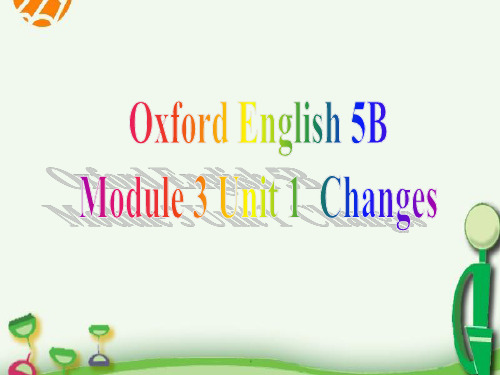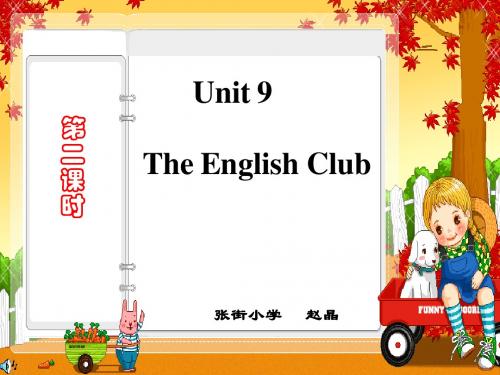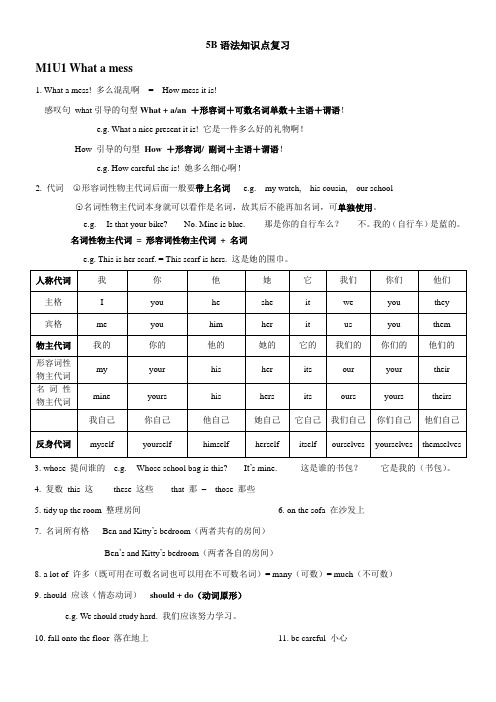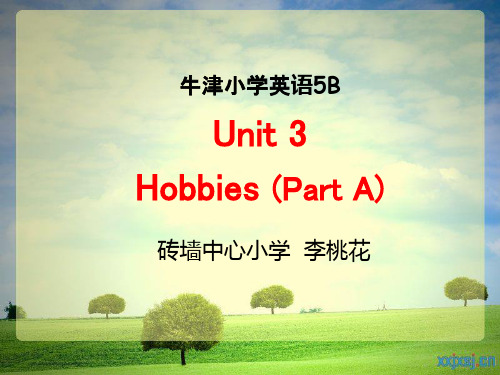上海牛津英语5B复习课件
- 格式:ppt
- 大小:657.01 KB
- 文档页数:50




授课主题上海牛津版英语5BM3U1同步讲义教学目标1.掌握M3U1重点词汇:sign, camera, litter, parking等2.掌握重点句型:What does it mean/say…? / It means/says we can/can’t..3.掌握情态动词can,must,should的基本用法及其否定形式教学重难点重点:同步词汇及句型的记忆难点:情态动词的具体运用;情态动词的同义句转换:You shouldn’t=No doing等教学内容1.你认识这些标识吗?2.单词默写:____________________________________________________________________________________ ____________________________________________________________________________________ ____________________________________________________________________________________ ____________________________________________________________________________________ ____________________________________________________________________________________ ____________________________________________________________________________________【知识梳理1】词汇1.telephone n.电话;电话机vt.& vi.给(某人)打电话= phone【词汇扩展】复数:telephones 第三人称单数:telephones上海牛津版英语5BM3U1同步讲义•1.基本结构:主语+ will+动词原形+其他例: He will play(play) football tomorrow.2.常见的时间标志:(1) tomorrow, tomorrow+时间: tomorrow morning/afternoon/evening...(2) next+时间: next week(下周)...(3) in+一段时间: in 2050, in five days(4)…later: five days later 五天后(5) this…: this afternoon/evening/Sunday/week/month/year...▲其他一些时间标志: in the future(在将来), one day(一天), someday(未来某一天), soon(不久)3.一般将来时改写句子1)一般疑问句:提前情态动词will至句首,句号变问号,即will+主语+动词原形+其他…?例: He will visit his grandma next Sunday. →Will he visit his grandma next Sunday?2)否定句:在will后面+not,即“主语+will+not+动词原形+其他”, will not可缩写成won't例: He will visit his grandma next Sunday. →He won't visit his grandma next Sunday.3)特殊疑问句:结构:特殊疑问句= 特殊疑问词+一般疑问句I.选出在意义上属于不同类单词的选项:( )1.A. drop B. pick C. walk D. entrance( )2.A. should B. can C. do D. must( )3.A. hospital B. exit C. toilet D. restaurant( )4.A. computer B. television C. telephone D. bedroom( )5.A. noisy B. sign C. dirty D. cleanKeys:DCBDBII. 按要求写单词:1. flowers(单数)___________2. picnic(复数)__________Keys: 1. A 2. C 3. B 4. C 5. BII.阅读短文选择最恰当的答案:Monday mornings are usually terrible(糟糕的). Father gets up late. He is always in a hurry. He doesn’t do morning exercises. He doesn’t go for a running. He doesn’t have breakfast. He runs to the bus stop, but he often misses the bus. He is always late for work on Monday. Sometimes his boss shouts at him. Sometimes his boss is late too. Haha… What terrible Mondays!( ) 1. On Monday morning father is always ________.A. earlyB. busyC. in a hurry( ) 2. Father doesn’t have breakfast on Monday morning because ________.A. he doesn’t do morning exercisesB. he runs to workC. he’s afraid to be late for work( ) 3. Father goes to work ________.A. on footB. by busC. take a bus( ) 4. ________ is/are sometimes late for work on Monday.A. FatherB. His bossC. Father and his boss( ) 5. Father _______ late on Monday mornings.A.gets upB. goes to bedC. goes joggingKeys: 1. C 2. C 3. B 4. B 5. A1.重点词汇:sign telephone walk smoking swimming restaurant toilet2.重要句型:You can’t ride here. =____________________________ =____________________________3. 掌握并了解一般将来时:________________________________________________III. Fill in the blanks with the given words in their proper forms (用所给单词的适当形式填空)。

5B语法知识点复习M1U1 What a mess1. What a mess! 多么混乱啊= How mess it is!感叹句what引导的句型What + a/an +形容词+可数名词单数+主语+谓语!e.g. What a nice present it is! 它是一件多么好的礼物啊!How 引导的句型How +形容词/ 副词+主语+谓语!e.g. How careful she is! 她多么细心啊!2. 代词○1形容词性物主代词后面一般要带上名词 e.g. my watch, his cousin, our school○2名词性物主代词本身就可以看作是名词,故其后不能再加名词,可单独使用。
e.g. -- Is that your bike? -- No. Mine is blue. -- 那是你的自行车么?-- 不。
我的(自行车)是蓝的。
名词性物主代词= 形容词性物主代词+ 名词e.g. This is her scarf. = This scarf is hers. 这是她的围巾。
3. whose 提问谁的 e.g. -- Whose school bag is this? -- I t’s mine. -- 这是谁的书包?-- 它是我的(书包)。
4. 复数this 这- these 这些that 那–those 那些5. tidy up the room 整理房间6. on the sofa 在沙发上7. 名词所有格Ben and Kitty’s bedroom(两者共有的房间)Ben’s and Kitty’s bedroom(两者各自的房间)8. a lot of 许多(既可用在可数名词也可以用在不可数名词)= many(可数)= much(不可数)9. should 应该(情态动词)should + do(动词原形)e.g. We should study hard. 我们应该努力学习。
